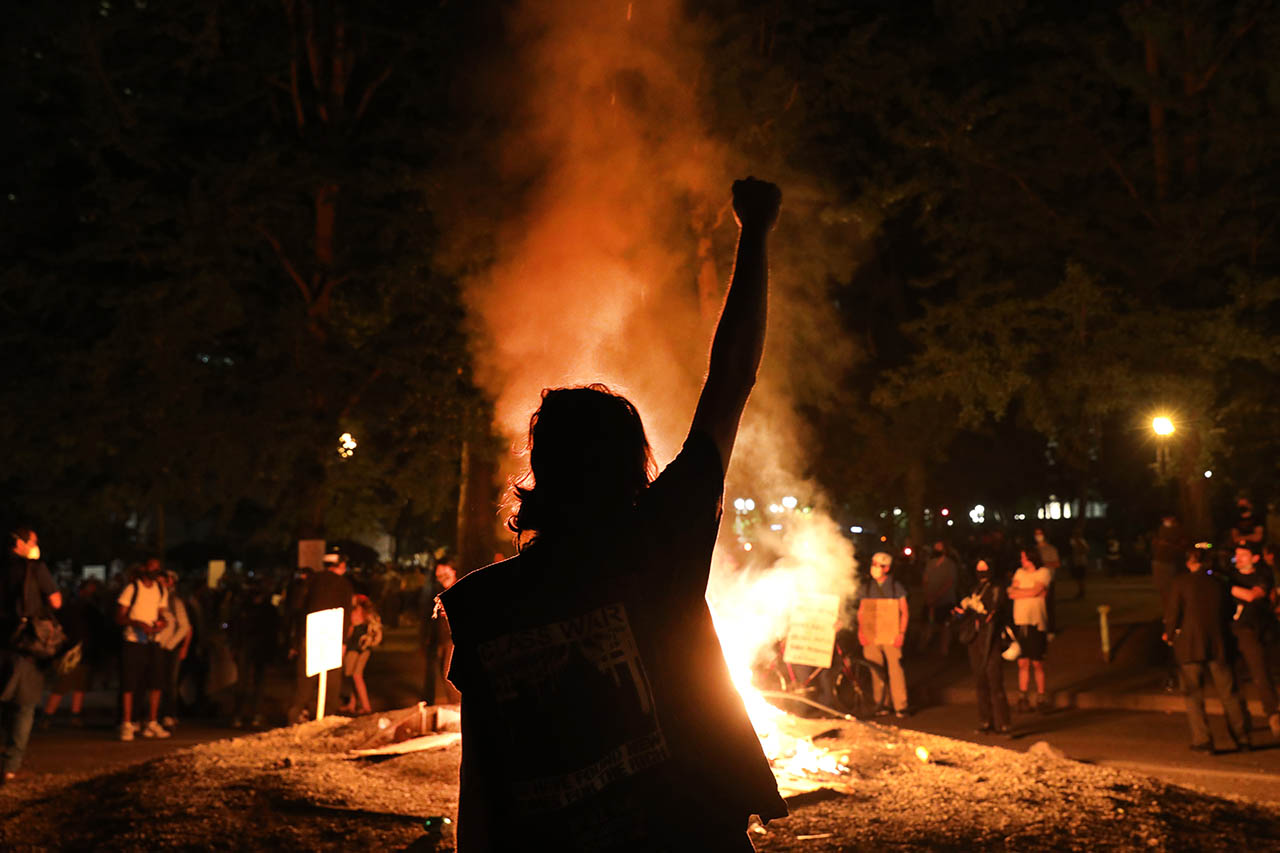PORTLAND, ORE. — The two cops standing guard outside the Portland Police Bureau look tired. It’s the 54th consecutive night of the city’s Black Lives Matter protests, and the street-festival-cum-revolution in the small park outside the Oregon federal courthouse has gone largely unmolested by local law enforcement. “The courthouse is basically theirs for most of the day,” one officer admits. “We don’t really move in until they start setting fires.”
The fires don’t start until later in the night. The tone of the daytime occupation is cheerful: The air is thick with the stench of marijuana, and well-dressed college students mingle with septuagenarian ex-hippies sporting tie-dye Bernie shirts, suburban moms, grungy teens, wild-eyed bums and professional activists from the city’s many protest outfits.
An entrepreneurial duo has set up a stand in the middle of the street selling Black Lives Matter shirts and face masks, and another vendor down the way is marketing vegan kebabs. A woman weaves through the crowd handing out water bottles, earplugs and other protest essentials, singing along to the rhythmic bass line of a hip-hop song emanating from a set of speakers on the park’s southeast end (the lyrics are unambiguous: “Cop shot, cop shot, cop shot, cop shot, / Keep shooting my people, / We will shoot back”).
Cops, for their part, are nowhere to be seen; an organizer helping to block off car access to the four-block protest zone tells me that they usually don’t move in until around midnight.
As the demonstrations near their third month, officers and activists have become locked in a nightly choreographed pattern with no visible resolution. For all the revolutionary fervor, the spectacle feels routine.
When the first flash-bang goes off around 11:30, the protesters’ main concern is that the cops’ unusually early arrival is a violation of the unwritten police-protest contract: “What the hell, guys?” yells an indignant demonstrator. “You’re not supposed to be here for another 30 minutes!”
The police’s task is thankless. Officers have few allies in the city’s infamously left-wing local government, but their lackluster response to destructive violencefrom radical anarchist groups like antifa has also invited criticism from the right. The police navigate between appeasing Portland’s influential activist class and answering to national conservative pundits.
This unannounced arrival of federal agents from the Department of Homeland Security has made the p.r. dance more challenging still. The feds have been much more aggressive than their local counterparts, making at least 43 arrests in Portland since July 4 — and provoking progressive outrage.
A series of viral videos, allegedly showing DHS personnel in unmarked cars arresting people at random, drew rebukes from Democrats at all levels of government. Portland Mayor Ted Wheeler called it “abhorrent,” while Oregon Gov. Kate Brown decried it as “a blatant abuse of power by the federal government”; both of the state’s senators introduced legislation to block federal agents from operating in the city.
The DHS has stood its ground, defending the use of unmarked vehicles and uniforms as routine law-enforcement practice and citing recent instances of “doxxing” of officers. Agents were “only targeting those who have been identified as committing criminal acts,” DHS maintains.
The media have played down the main reason for federal agents being in Portland: a neutered police department has ceded a portion of the city to violent anarchists, who have staged an ongoing riot — firebombing the police station, physically assaulting officers and causing tens of thousands of dollars of property damage. “Any form of resistance is a good way to push our goals forward,” a spokeswoman for the Portland Black Youth Movement told me.
For all that, however, the protests feel more performative than substantive. Activists pump their fists in the air and stare defiantly into the row of 15 or 20 police officers on the other side of the street as photographers snap pictures from a safe distance; well-to-do middle-aged women wax poetic on the importance of social justice as a background narration to their iPhone videography; undergrads pose with handmade signs for their friends’ Instagram postings; a teenager on a skateboard flashes the middle finger to a line of cops in riot gear.
And suddenly, as soon as it’s started, it’s over. After less than half an hour of battling, the police and federal agents decide that they’ve had enough, disappearing into a nearby building for the night. The mob lets out a roar of victory. They’ve “won,” again. In cities like Portland, they’ve been winning for years.
This piece originally appeared at New York Post
_____________________
Nate Hochman is a rising senior at Colorado College. This piece was adapted from City Journal.
This piece originally appeared in New York Post
